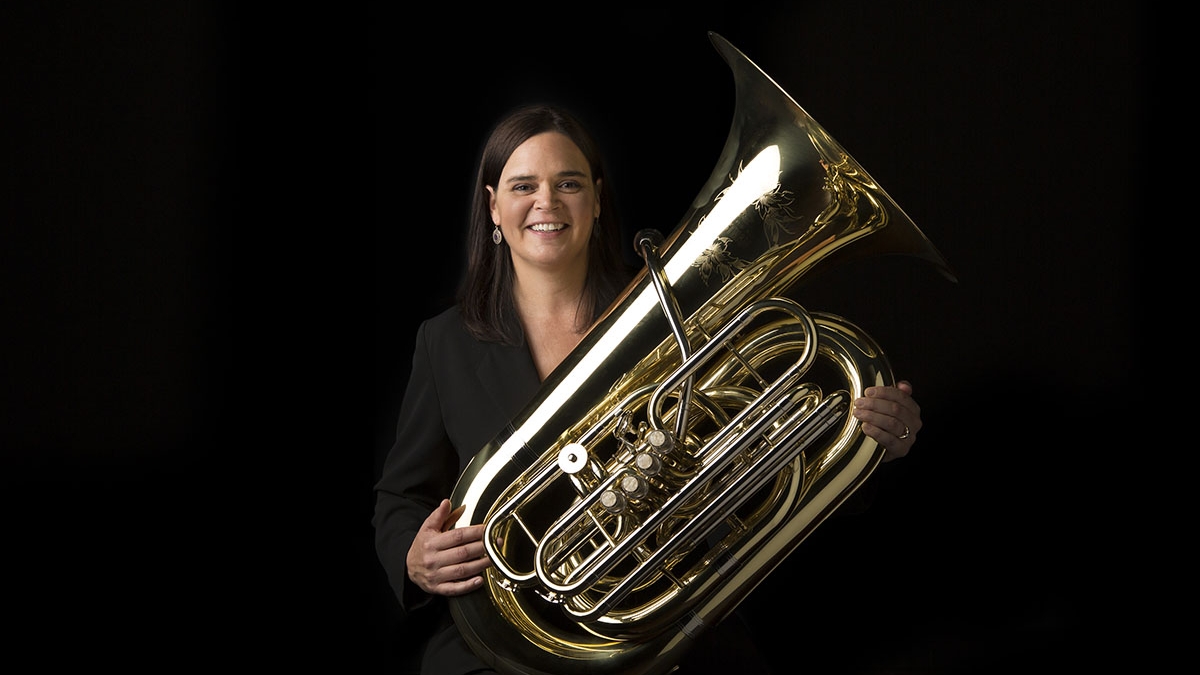Music professor receives international award for excellence in teaching

Deanna Swoboda has enjoyed a vibrant career as a performer, educator and entrepreneur and has been teaching full time at the university level for 17 years and as adjunct faculty prior. She has performed hundreds of solo recitals and presentations throughout the United States and Europe.
Deanna Swoboda, associate professor in the School of Music, Dance and Theatre in Arizona State University’s Herberger Institute for Design and the Arts, is the first woman to be awarded the International Tuba Euphonium Association’s (ITEA) Excellence in Teaching Award.
One of the most prestigious in the tuba world, the award is given in recognition of demonstrated excellence in the teaching of tuba and euphonium, advancement of the pedagogy of those instruments and dedication to the mentoring of young musicians.
“I have always taught and performed professionally equally, and I am equally passionate about both,” said Swoboda. “I appreciate the opportunity to help students find their chosen career path and how to create success and happiness for themselves.”
Swoboda was nominated by a former student who collected numerous letters of support outlining Swoboda’s teaching and contributions to the academic world written by her current students, former students and colleagues. The winner is determined by the ITEA board of directors after reviewing all the international nominations and letters submitted.
“The fact that someone takes the time to nominate you, and then contact your students and your colleagues on your behalf, and then ask them to support you is quite an honor,” said Swoboda.
The awardee must have a minimum of 10 years of full-time teaching experience in a tuba/euphonium position and be nominated by a colleague or a current or former student. There have been six awardees in the past 12 years, with one award given every two years.
Swoboda has enjoyed a vibrant career as a performer, educator and entrepreneur and has been teaching full time at the university level for 17 years and as adjunct faculty at universities or colleges prior. While teaching, she maintained a solo career and also toured with the Dallas Brass, with whom she still performs as a substitute tuba player. She has performed hundreds of solo recitals and presentations throughout the United States and Europe, including the United States Army String Orchestra, the Deutsches Tubaforum, the National Conservatory of Madrid and the St. Petersburg Conservatory. She has also performed concerts and presentations around the U.S. that support and enhance public school music programs. She is a past president for the International Tuba Euphonium Association and is an Eastman Music Company tuba artist.
Swoboda said her multifaceted career is one reason she likes to teach in the school’s entrepreneurship program and help students think about careers and how they, as artists, can piece together many different options — with the artist at the center and career options to perform, to teach, to conduct research and more.
The first instrument Swoboda learned to play was the clarinet in fourth grade. In eighth grade, she switched to tuba – all because she had a crush on a boy and wanted to sit next to him. As it turned out, Swoboda fell in love with playing the tuba. She was motivated to practice, play more and be more involved in music at school, including orchestra and community music playing with New Orleans-style groups. She also sang in the choir and played in the jazz band and in the marching band through junior high and high school, eventually choosing music as her career path.
“As a teacher, it is my responsibility to help students recognize opportunities for performing and for teaching — what a career can look like in music as a young tuba player or euphonium player,” said Swoboda. “Part of the reason that I teach for the music entrepreneurship program at ASU is to help all of our students realize and recognize the importance of having business skills and marketing skills as creative artists. No matter what your chosen art form, you also need to have other skills of communication, marketing and business finance. You need to know branding — how to put yourself out there as an artist and be successful.”
Swoboda said that it is important not only to be prepared for the opportunity that may be presented, but also to create opportunities and learn how to look at what you currently have and what's out there to find a gap where you can fit in and create something new in the music business or the art world.
“No matter your instrument in your chosen career path, with determination, education and creating your own opportunities, anything is possible, especially at ASU,” said Swoboda. “There are so many opportunities for expanding your knowledge and putting yourself out there in the world — enjoying what you do and being successful at what you do.”
More Arts, humanities and education

Local traffic boxes get a colorful makeover
A team of Arizona State University students recently helped transform bland, beige traffic boxes in Chandler into colorful works…

2 ASU professors, alumnus named 2025 Guggenheim Fellows
Two Arizona State University professors and a university alumnus have been named 2025 Guggenheim Fellows.Regents Professor Sir…

No argument: ASU-led project improves high school students' writing skills
Students in the freshman English class at Phoenix Trevor G. Browne High School often pop the question to teacher Rocio Rivas.No,…

